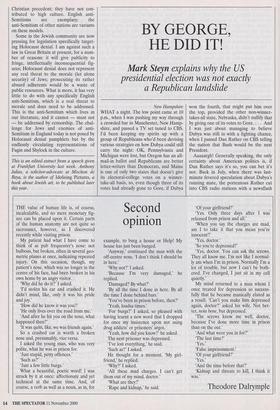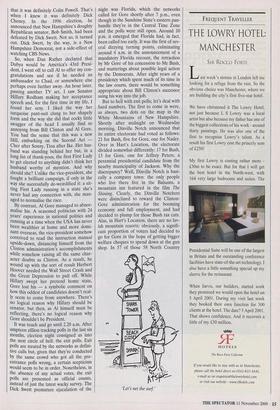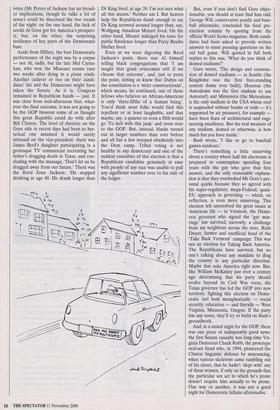BY GEORGE, HE DID IT!
Mark Steyn explains why the US
presidential election was not exactly a Republican landslide
New Hampshire WHAT a night. The low point came at 10 p.m., when I was pushing my way through a crowded bar in Manchester, New Hamp- shire, and passed a TV set tuned to CBS. I'd been keeping my spirits up with a group of Republicans who'd been devising various strategies on how Dubya could still carry the night: OK, Pennsylvania and Michigan were lost, but Oregon has an all- mail-in ballot and Republicans are better letter-writers than Democrats, and Maine is one of only two states that doesn't give its electoral-college votes on a winner- take-all basis, so, even though three of its votes had already gone to Gore, if Dubya won the fourth, that might put him over the top, provided the other non-winner- takes-all state, Nebraska, didn't nullify that by giving one of its votes to Gore. . . . And I was just about managing to believe Dubya was still in with a fighting chance, when I passed Dan Rather on CBS telling the nation that Bush would be the next President.
Aaaaargh! Generally speaking, the only certainty about American politics is, if Dan Rather says it's so, you can bet it's not. Back in July, when there was last- minute fevered speculation about Dubya's running mate, the portentous Rather cut into CBS radio stations with a newsflash that it was definitely Colin Powell. That's when I knew it was definitely Dick Cheney. In the 1996 election, he announced that New Hampshire's doughty Republican senator, Bob Smith, had been defeated by Dick Swett. Not so, it turned out. Dick Swett, by the way, is a New Hampshire Democrat, not a side-effect of watching CBS News.
So, when Dan Rather declared that Dubya would be America's 43rd Presi- dent, I went off to call Al to offer my con- gratulations and see if he needed an ambassador to Chad, or somewhere else perhaps even further away. An hour later, passing another TV set, I saw Senator Hillary Rodham making her acceptance speech and, for the first time in my life, I found her sexy. I liked the way her turquoise pant-suit clung to her shapely form and the way she did that cocky little swagger of the head I usually find so annoying from Bill Clinton and Al Gore. You had the sense that this was a new Hill, embarking on the Second Act Cher after Sonny, Tina after Ike. Her hus- band was standing behind her but, in a long list of thank-yous, the first First Lady to get elected to anything didn't think her husband worthy of mention. And why should she? Unlike the vice-president, she fought a brilliant campaign, if only in the way she successfully de-weirdified it: a sit- ting First Lady running in a state she's never had any connection with, she man- aged to normalise the race.
By contrast, Al Gore managed to abnor- malise his. A seasoned politician with 24 years' experience in national politics and running at a time when the USA has never been wealthier at home and more domi- nant overseas, the vice-president somehow contrived to read the instruction manual upside-down, distancing himself from the Clinton administration's accomplishments while somehow raising all the same char- acter doubts as Clinton. As a result, he wound up with the sort of result Herbert Hoover needed the Wall Street Crash and the Great Depression to pull off. While Hillary swept her pretend home state, Gore lost his — a symbolic comment on how this oddest of candidates doesn't real- ly seem to come from anywhere. There's no logical reason why Hillary should be senator, but then, as Al himself must be reflecting, there's no logical reason why Gore shouldn't be President.
It was touch and go until 2.20 a.m. After umpteen zillion tracking polls in the last six months, election night consigned us into the next circle of hell: the exit polls. Exit polls are treated by the networks as defini- tive calls but, given that they're conducted by the same crowd who got all the pre- entrance polls wrong, a certain scepticism would seem to be in order. Nonetheless, in the absence of any actual votes, the exit polls are presented as official counts, instead of just the latest wacky survey. The Dick Swett premature ejaculation of the night was Florida, which the networks called for Gore shortly after 7 p.m., even though in the Sunshine State's eastern pan- handle they're in the Central Time Zone and the polls were still open. Around 10 p.m. it emerged that Florida had, in fact, been called too early. It was the first of sev- eral dizzying turning points, culminating around 4 a.m. in the announcement of a mandatory Florida recount, the retraction by Mr Gore of his concession to Mr Bush, and mutterings about possible legal action by the Democrats. After eight years of a presidency which spent much of its time in the law courts, there would be something appropriate about Bill Clinton's successor suing his way into the job.
But to hell with exit polls; let's deal with hard numbers. The first to come in were, as always, two dots on the map in the White Mountains of New Hampshire. Shortly after midnight on Wednesday morning, Dixville Notch announced that its entire electorate had voted as follows: 21 for Bush, five for Gore, one for Nader. Over in Hart's Location, the electorate divided somewhat differently: 17 for Bush, 13 for Gore, one for Jeffrey Peters, a perennial presidential candidate from the nearby municipality of Jackson. Why the discrepancy? Well, Dixville Notch is basi- cally a company town: the only people who live there live in the Balsams, a mountain inn featured in the film The Shining. Clearly, the Dixville Notchers were disinclined to reward the Clinton- Gore administration for the booming economy and full employment, and had decided to plump for those Bush tax cuts. Alas, in Hart's Location, there are no lav- ish mountain resorts: obviously, a signifi- cant proportion of voters had decided to go for Gore in the hope of getting bigger welfare cheques to spend down at the gun shop. In 57 of those 58 North Country `Let's net the surf.' votes (Mr Peters of Jackson has no broad- er implications, though he talks a lot of sense) could be discerned the two trends of the night: on the one hand, the lack of credit-Al Gore got for America's prosperi- ty, but, on the other, the surprising resilience of key parts of the Democratic base.
Aside from Hillary, the best Democratic performance of the night was by a corpse — not Al, sadly, but the late Mel Carna- han, who won the Missouri senate race two weeks after dying in a plane crash. Another cadaver or two on their candi- dates' list and the Democrats might have taken the Senate. As it is, Congress remained in Republican hands — just. It was clear from mid-afternoon that, what- ever the final outcome, it was not going to be the GOP blowout some of us thought this great Republic could do with after Bill Clinton. The level of rhetoric on the Gore side in recent days had been so hys- terical one assumed it would surely rebound on the vice-president: there was James Byrd's daughter participating in a grotesque TV commercial recreating her father's dragging death in Texas, and con- cluding with the message, 'Don't let us be dragged away from our future.' There was the Revd Jesse Jackson: 'He stopped drinking at age 40. He drank longer than Dr King lived, at age 39. I'm not sure what all this means.' Neither am I. But heaven help the Republican dumb enough to say Dr King screwed around longer than, say, Wolfgang Amadeus Mozart lived. On the other hand, Mozart indulged his taste for public flatulence longer than Percy Bysshe Shelley lived.
Even as we were digesting the Revd Jackson's point, there was Al himself telling black congregations that 'I am taught that good overcomes evil if we choose that outcome', and, just to press the point, letting us know that Dubya on the constitution is a `strict constructionist', which means, he continued, one of those fellows who believes an African-American is only 'three-fifths of a human being'. You'd think most folks would find this repellent or at least laughable, and that maybe, say, a quarter or even a fifth would go `To hell with this junk' and cross over to the GOP. But, instead, blacks turned out in larger numbers than ever before and all but a few trooped obediently into the Dem camp. Tribal voting is not healthy in any democracy and one of the saddest casualties of this election is that a Republican candidate genuinely at ease with people of any race was unable to pull any significant number over to his side of the ledger. But, even if you don't find Gore objec- tionable, you should at least find him odd. George Will, conservative pundit and base- ball aficionado, concluded his final pre- election column by quoting from the official World Series magazine. Both candi- dates had been asked to provide written answers to some pressing questions on the old ball game. Will quoted in full both replies to this one, 'What do you think of domed stadiums?'
Gore wrote, 'The design and construc- tion of domed stadiums — in Seattle (the Kingdome was the first free-standing cement dome ever built), Houston (the Astrodome was the first stadium to use Astroturf) and Minnesota (the Metrodome is the only stadium in the USA whose roof is suspended without beams or rods — it's supported by air pressure), for example have been feats of architectural and engi- neering excellence. But the real measure of any stadium, domed or otherwise, is how much fun you have inside.'
Bush wrote, 'I like to go to baseball games outdoors.'
There's something a little unnerving about a country where half the electorate is prepared to contemplate spending four years with the guy who gave that first answer, and the only reasonable explana- tion is that they overlooked Mr Gore's per- sonal quirks because they so agreed with his super-regulatory, mega-Federal, quasi- EU approach to governing — which, on reflection, is even more unnerving. This election left unresolved the great issues in American life — in Vermont, the Demo- crat governor who signed the 'gay mar- riage' law survived, narrowly, a challenge from my neighbour across the river, Ruth Dwyer, farmer and unofficial head of the `Take Back Vermont' campaign. This was not an election for Taking Back America. The Republicans have survived, but no one's talking about any mandate to drag the country in any particular direction. Maybe that suits America right now. But, like William McKinley just over a century ago determining that his party should evolve beyond its Civil War roots, the Texas governor has led the GOP into new territory, fighting this election on Demo- cratic turf both metaphorically — social security, education — and literally — West Virginia, Minnesota, Oregon. If the party has any sense, they'll try to build on Bush's groundwork.
And, in a mixed night for the GOP, there was one piece of indisputably good news: the first Senate casualty was long-time Vir- ginia Democrat Chuck Robb, the prototype oral-sex fiend who, in 1994, pioneered the Clinton linguistic defence by announcing, when various skeletons came tumbling out of his closet, that he hadn't 'slept with' any of these women, if only on the grounds that the particular sex act to which he's prone doesn't require him actually to be prone. One way or another, it was not a good night for Democratic fellatio aficionados.




























































































 Previous page
Previous page